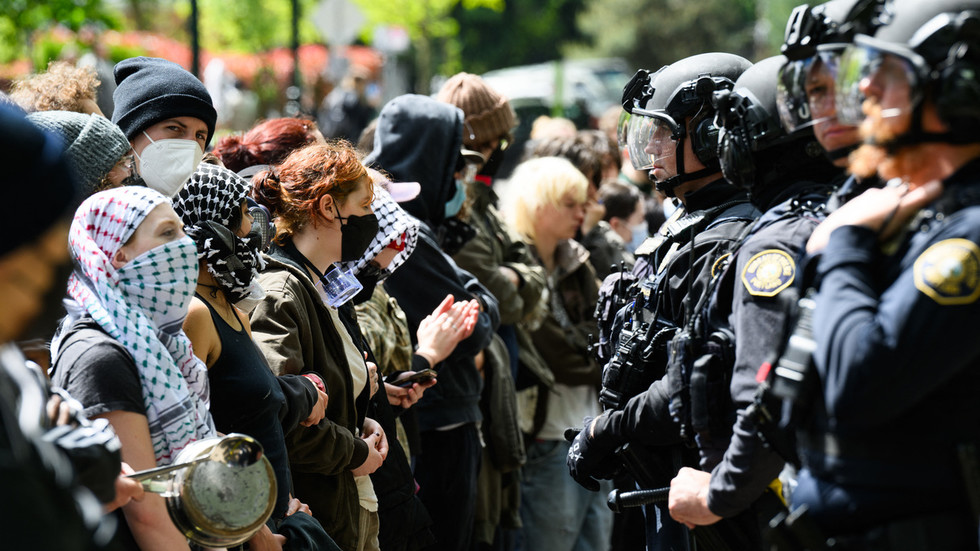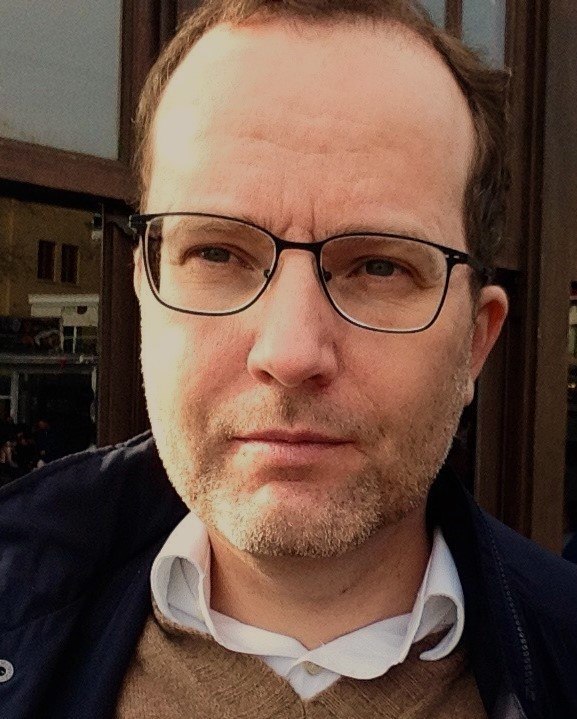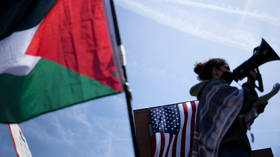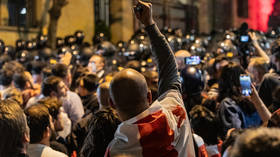
The meaning of the words ‘civil society’ changes depending on whether Washington is speaking about protests inside or outside the American border

By Tarik Cyril Amar, a historian from Germany working at Koç University, Istanbul, on Russia, Ukraine, and Eastern Europe, the history of World War II, the cultural Cold War, and the politics of memory
By Tarik Cyril Amar, a historian from Germany working at Koç University, Istanbul, on Russia, Ukraine, and Eastern Europe, the history of World War II, the cultural Cold War, and the politics of memory
@tarikcyrilamartarikcyrilamar.substack.comtarikcyrilamar.com

Police and pro-Palestine protesters stand-off in front of the barricaded Portland State University library on May 2, 2024 in Portland, Oregon © Mathieu Lewis-Rolland / GETTY IMAGES NORTH AMERICA / Getty Images via AFP
The elites and mainstream media of the West are so addicted to double standards that spotting yet another one is hardly news. These are the people who have just given us genocide re-labeled as ”self-defense,” who abhor spheres of influence except when they are global and belong to Washington (with a sidekick role for Brussels), and who insist on the rule of law while threatening the International Criminal Court if it so much as dares look their way.
Yet there is something special about the latest case of Western ‘values’ schizophrenia, this time about the concept of ‘civil society’ in conjunction with two political struggles, one in the US and the other in the Caucasus nation of Georgia.
In the US, students, professors, and others are protesting against the ongoing Israeli genocide of the Palestinians and against American participation in that crime. In Georgia, the issue at stake is a proposed law to impose transparency on the sprawling and unusually powerful NGO sector. Its critics denounce this law as a government power grab and as somehow ‘Russian’ (which, spoiler alert, it is not).
The very different reactions to these two cases of intense public contention by the West’s political and mainstream media elites show that, for them, there are really two kinds of civil society: There is the ‘vibrant’ variety, with ‘vibrant’ an almost comically ossified cliche, used by the Washington Post Editorial Board, in EU statements, and by White House spokesman John Kirby, to name only a few. It is almost as if someone had sent around a memo on proper terminology. This vibrant, good kind of civil society is to be celebrated and supported.
And then there is the wrong kind of civil society, which must be shut down. US President Joe Biden has just expressed the essence of this attitude: “We are a civil society, and order must prevail.” This is, of course, a bizarre misreading of the idea of civil society. Ideally, its key features are autonomy from the state and the capacity to establish an effective counterweight, and even, if necessary, to offer resistance to it. Putting the emphasis on “order” instead is ignorant or dishonest. In reality, civil society makes no sense, even as an ideal, if it is not granted a substantial degree of freedom to be disorderly. A civil society that is so orderly as to disturb no one is a fig leaf for enforced conformism and – at least – incipient authoritarianism.

Read more
But let’s set aside the mundane fact that Joe Biden says things that display ignorance or duplicity. What is more important is that ‘order,’ in his usage, is a transparent euphemism: According to the New York Times, over the last two weeks, over 2,300 protesters have been arrested on almost 50 American campuses. Often, arrests have been made with demonstrative brutality. Police have used riot gear, stun grenades, and rubber bullets. They have assaulted students as well as some professors with massive aggression.
The most well-known individual case at this moment is that of Annelise Orleck, a professor at Dartmouth College. Orleck is 65 years old and attempted to protect students from police violence. In response, she was slammed into the ground in the worst MMA style, knelt on by beefy policemen, who clearly lack elementary decency, and dragged away with whiplash trauma, as if she had been in a serious car accident. Ironically (if that’s the word), Orleck is Jewish and, at one time, used to be the head of her universities program in Jewish Studies.
In another, extremely disturbing development, at the University of California, Los Angeles (UCLA), a violent police crackdown – including use of rubber bullets – was preceded by a vicious attack by so-called pro-Israeli ”counter-protesters.” In reality, this was a mob out to inflict maximum harm on the anti-genocide protesters, who, a New York Times investigation has found, maintained an almost entirely defensive stance. University security forces and the police failed to intervene for hours, letting the “counter-protesters” run wild. That is a pattern every historian of the rise of fascism in Weimar Germany will recognize: First the SA mobs of the rising Nazi party had a free hand to assault the Left, then the police would go after the same Left as well.
That is the real face of the “order” that President Biden and all too many in the West’s establishments endorse. But only at home. When it comes to the unrest in Georgia, their tone is entirely different. Make no mistake, there has been substantial violence – and what Biden would denounce as “chaos” if it happened in America – in Georgia. Indeed, while the US anti-genocide protesters have not been violent but disorderly (yes, those are very different things), the protesters in Georgia have used genuine violence, for instance, when they tried to storm the parliament.
Nothing remotely comparable has been done by the US anti-genocide protesters. Regarding the trespassing and causing public inconveniences that so agitate the US president, there has been plenty of that in the Georgian capital, Tbilisi. By Biden’s logic a protest must not even disturb or delay a campus graduation ceremony. What would that imply for blocking a central traffic node in the capital city?

Read more
Don’t get me wrong: The Georgian protesters report violent police tactics used against them as well, and, more broadly, the rights or wrongs of their cause, or the draft law they reject are beyond the scope of this article. I do believe they are used by the West for a geopolitical play Color-Revolution-style, but that is not the point.
The pertinent point here is, once again, staggering Western hypocrisy: A West that thinks trying to storm parliament is part of having a “vibrant” civil society in Georgia, cannot mass-arrest and brutalize anti-genocide protesters on its own campuses. That is, of course, also the message of Georgian prime minister Irakli Kobakhidze, who clearly has had enough of the absurdity.
In a resonant post on X, Kobakhidze objected forcefully to American “false statements” about the controversial draft law as well as, more importantly, US interference in Georgian politics in general. The prime minister, in essence and very plausibly for the non-naive, named and shamed Washington’s habit of trying out a “color revolution” at regular intervals. Finally, he reminded his American interlocutors “about a brutal crackdown of the students’ protest rally in New York City.” With that phrase clearly standing for the totality of police repression against young Americans who object to genocide, Kobakhidze turned the tables.
And that is, perhaps, the most intriguing take-away from this fresh but not unprecedented episode of the long-running saga of Western double standards. To find condemnation and suppression of almost entirely peaceful protests against genocide, while more violent protests against a law to regulate NGOs are being celebrated – that is shameful but not new. As before, geopolitics trumps ‘values.’
But ‘civil society’ used to be a key concept for projecting Western soft power by, in essence, subversion and manipulation. It was so useful because its ideological charge was so powerful that its mere invocation stifled resistance. Now, by displaying how it handles its own civil society at home, the West is ruining yet another useful illusion.
The statements, views and opinions expressed in this column are solely those of the author and do not necessarily represent those of RT.




